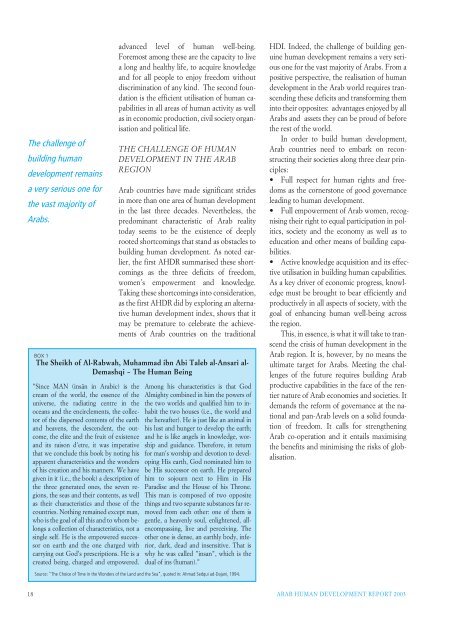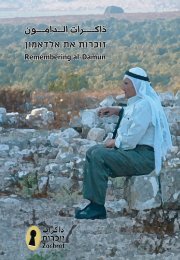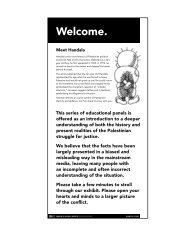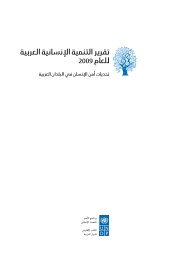PART IChanges in <strong>human</strong> <strong>development</strong> in Arabcountries during 2001-2002Starting with this second issue, the ArabHuman Development Report (AHDR) seriesinitiates a new practice of including an openingsection devoted to assessing recent trendsand events that have influenced <strong>human</strong> <strong>development</strong>in the Arab region. The assessment includesevents that took place on both theexternal (regional and international) and theinternal (Arab country) levels, and covers theperiod since work began on the previous <strong>report</strong>in the series.INTRODUCTION: THE STATE OFHUMAN DEVELOPMENT IN ARABCOUNTRIESTHE CONTENT OF HUMANDEVELOPMENTThe concept of "<strong>human</strong> <strong>development</strong>" hasgained popularity since 1990 when the UnitedNations Development Programme (UNDP)adopted the term with a specific connotation,advanced a new index (the HDI) to measureit 1 , and started publishing an annual <strong>report</strong> onthe subject.The <strong>human</strong> <strong>development</strong> concept, as it hasevolved over the years, is based on an intellectualheritage that places people at the centre of<strong>development</strong> and which culminated in the firstHuman Development Report (UNDP, 1990).The concept maintains that "people are thetrue wealth of nations" 2 and that <strong>human</strong> <strong>development</strong>is a "process of expanding people’schoices". Since freedom is essential for the exerciseof choice, freedom is a fundamental requirementof <strong>human</strong> <strong>development</strong>. "Choices"is an expression of the more sophisticated conceptof "entitlements" introduced by AmartyaSen 3 , as an expression of people’s basic rightto these "choices". The concept stipulates that<strong>human</strong> beings, simply by being <strong>human</strong>, havean inalienable right to a decent living in bodyand soul.Two important implications flow from thisconcept: first, <strong>human</strong> <strong>development</strong> rejects outrightany form of discrimination among<strong>human</strong> beings on whatever basis: gender, originor belief. Second, <strong>human</strong> well being is notlimited to material dimensions but extends tothe individual’s moral participation in societyand to all aspects of a decent life, such asbeauty, <strong>human</strong> dignity and self-fulfillment.People’s entitlements are, in principle, unlimitedand grow rapidly with <strong>human</strong>progress. Yet at any level of <strong>development</strong>, thethree main entitlements, in the opinion of theHuman Development Report, are "to live along and healthy life, to acquire knowledgeand to possess resources necessary for a decentlife". Human <strong>development</strong>, however, does notstop at that minimum but goes beyond it to includeother entitlements such as "political,economic and social freedoms, opportunitiesfor production and creativity, the enjoymentof liberty, self-fulfillment, and respect for<strong>human</strong> rights".Thus, <strong>human</strong> <strong>development</strong> is much morethan the <strong>development</strong> of <strong>human</strong> resources. Itis a genuinely <strong>human</strong>e approach to the comprehensiveand integrated <strong>development</strong> of<strong>human</strong> beings and societal institutions aimedat achieving the higher goals of <strong>human</strong> existence:freedom, justice and <strong>human</strong> dignity.The <strong>human</strong> <strong>development</strong> process rests on twoessential foundations: the first is the buildingof <strong>human</strong> capacities that allow for access to anHuman <strong>development</strong>is a genuinely <strong>human</strong>eapproach to thecomprehensive andintegrated<strong>development</strong> of<strong>human</strong> beings andsocietal institutionsaimed at achievingthe higher goals of<strong>human</strong> existence:freedom, justice and<strong>human</strong> dignity.1The HDI has undoubtedly been a major improvement over GDP per capita as a measure of <strong>development</strong>.2The phrase was first used in Frederick Harbison’s famous book, Human Resources as the Wealth of Nations (1973)31998 Nobel Prize winner in economics in recognition of his work on poverty and famines.PART I: CHANGES IN HUMAN DEVELOPMENT IN ARAB COUNTRIES DURING 2001-2002 17
The challenge ofbuilding <strong>human</strong><strong>development</strong> remainsa very serious one forthe vast majority ofArabs.advanced level of <strong>human</strong> well-being.Foremost among these are the capacity to livea long and healthy life, to acquire knowledgeand for all people to enjoy freedom withoutdiscrimination of any kind. The second foundationis the efficient utilisation of <strong>human</strong> capabilitiesin all areas of <strong>human</strong> activity as wellas in economic production, civil society organisationand political life.THE CHALLENGE OF HUMANDEVELOPMENT IN THE ARABREGIONArab countries have made significant stridesin more than one area of <strong>human</strong> <strong>development</strong>in the last three decades. Nevertheless, thepredominant characteristic of Arab realitytoday seems to be the existence of deeplyrooted shortcomings that stand as obstacles tobuilding <strong>human</strong> <strong>development</strong>. As noted earlier,the first AHDR summarised these shortcomingsas the three deficits of freedom,women’s empowerment and knowledge.Taking these shortcomings into consideration,as the first AHDR did by exploring an alternative<strong>human</strong> <strong>development</strong> index, shows that itmay be premature to celebrate the achievementsof Arab countries on the traditionalBOX 1The Sheikh of Al-Rabwah, Muhammad ibn Abi Taleb al-Ansari al-Demashqi – The Human Being"Since MAN (insân in Arabic) is thecream of the world, the essence of theuniverse, the radiating centre in theoceans and the encirclements, the collectorof the dispersed contents of the earthand heavens, the descendent, the outcome,the elite and the fruit of existenceand its raison d'etre, it was imperativethat we conclude this book by noting hisapparent characteristics and the wondersof his creation and his manners. We havegiven in it (i.e., the book) a description ofthe three generated ones, the seven regions,the seas and their contents, as wellas their characteristics and those of thecountries. Nothing remained except man,who is the goal of all this and to whom belongsa collection of characteristics, not asingle self. He is the empowered successoron earth and the one charged withcarrying out God's prescriptions. He is acreated being, charged and empowered.Among his characteristics is that GodAlmighty combined in him the powers ofthe two worlds and qualified him to inhabitthe two houses (i.e., the world andthe hereafter). He is just like an animal inhis lust and hunger to develop the earth;and he is like angels in knowledge, worshipand guidance. Therefore, in returnfor man's worship and devotion to developingHis earth, God nominated him tobe His successor on earth. He preparedhim to sojourn next to Him in HisParadise and the House of his Throne.This man is composed of two oppositethings and two separate substances far removedfrom each other: one of them isgentle, a heavenly soul, enlightened, allencompassing,live and perceiving. Theother one is dense, an earthly body, inferior,dark, dead and insensitive. That iswhy he was called "insan", which is thedual of ins (<strong>human</strong>)."HDI. Indeed, the challenge of building genuine<strong>human</strong> <strong>development</strong> remains a very seriousone for the vast majority of Arabs. From apositive perspective, the realisation of <strong>human</strong><strong>development</strong> in the Arab world requires transcendingthese deficits and transforming theminto their opposites: advantages enjoyed by allArabs and assets they can be proud of beforethe rest of the world.In order to build <strong>human</strong> <strong>development</strong>,Arab countries need to embark on reconstructingtheir societies along three clear principles:• Full respect for <strong>human</strong> rights and freedomsas the cornerstone of good governanceleading to <strong>human</strong> <strong>development</strong>.• Full empowerment of Arab women, recognisingtheir right to equal participation in politics,society and the economy as well as toeducation and other means of building capabilities.• Active knowledge acquisition and its effectiveutilisation in building <strong>human</strong> capabilities.As a key driver of economic progress, knowledgemust be brought to bear efficiently andproductively in all aspects of society, with thegoal of enhancing <strong>human</strong> well-being acrossthe region.This, in essence, is what it will take to transcendthe crisis of <strong>human</strong> <strong>development</strong> in theArab region. It is, however, by no means theultimate target for Arabs. Meeting the challengesof the future requires building Arabproductive capabilities in the face of the rentiernature of Arab economies and societies. Itdemands the reform of governance at the nationaland pan-Arab levels on a solid foundationof freedom. It calls for strengtheningArab co-operation and it entails maximisingthe benefits and minimising the risks of globalisation.Source: "The Choice of Time in the Wonders of the Land and the Sea”, quoted in: Ahmad Sedqui ad-Dajani, 1994.18 ARAB HUMAN DEVELOPMENT REPORT <strong>2003</strong>
- Page 2 and 3: United Nations Development Programm
- Page 5 and 6: Immersion, yes, but swamped or drow
- Page 7 and 8: level of development, help all its
- Page 9 and 10: interrelated issues in some depth.
- Page 11: ABBREVIATIONS AND ACRONYMSAFTAAHDIA
- Page 14 and 15: The Arab knowledge civilisation: so
- Page 16 and 17: Cultural interaction129CHAPTER 7SOC
- Page 18 and 19: 7.1 Patriarchal Society in Arab Cou
- Page 20 and 21: EXECUTIVE SUMMARYThe first Arab Hum
- Page 22 and 23: nowadays can provide the means to e
- Page 24 and 25: presence of significant human capit
- Page 26 and 27: movements with an Islamic mark unde
- Page 29 and 30: Arab citizens areincreasingly pushe
- Page 31 and 32: Constitutions, lawsand administrati
- Page 33: PART IChanges in human development
- Page 37 and 38: The AHDR was a bellthat rang at the
- Page 39 and 40: Governments, statingconsiderations
- Page 41 and 42: BOX 6Human Rights Watch Report 2002
- Page 43 and 44: Occupation posed toIraqis a new cha
- Page 45 and 46: Arab countries, onaverage, continue
- Page 47 and 48: In most Arab countriesthe march of
- Page 49 and 50: The core challenges tohuman develop
- Page 51 and 52: CHAPTER 1Conceptual framework: know
- Page 53 and 54: level of society, between knowledge
- Page 55 and 56: it. As such, the returns to knowled
- Page 57 and 58: knowledge vary and interact, especi
- Page 59 and 60: of calculation systems and the util
- Page 61 and 62: BOX 1.5Ahmad Kamal Aboulmagd: Towar
- Page 63 and 64: Figure 1.4PC availability and Inter
- Page 65 and 66: PART IISection two: the state of kn
- Page 67 and 68: The most seriousproblem facing Arab
- Page 69 and 70: Communication ineducation is didact
- Page 71 and 72: One of the mainfeatures of manyuniv
- Page 73 and 74: The evaluation indicates that priva
- Page 75 and 76: Official Arab satellitechannels dom
- Page 77 and 78: The harassment ofthe press under th
- Page 79 and 80: Figure 2.7Personal computers: Arab
- Page 81 and 82: There is clearly alarger role for t
- Page 83 and 84: ooks for translation in order to fu
- Page 85 and 86:
Arabic research activitycontinues t
- Page 87 and 88:
Workers in scientific research andd
- Page 89 and 90:
TABLE 3.3Number of scientific resea
- Page 91 and 92:
Restricting intellectualfreedom is
- Page 93 and 94:
Figure 3.3Number of publications -
- Page 95 and 96:
when economic crises and security c
- Page 97 and 98:
The main threat to freeliterature a
- Page 99 and 100:
CHAPTER 4Measuring knowledge capita
- Page 101 and 102:
noted, the current attempt to measu
- Page 103 and 104:
esearch and development and arts pr
- Page 105 and 106:
velopment. Does the disparity in hu
- Page 107 and 108:
ple)7. Book titles (per million peo
- Page 109 and 110:
Despite the methodological and othe
- Page 111 and 112:
Figure 5.1:Actors and linkages in t
- Page 113 and 114:
Industrial R&Dinstitutions are weak
- Page 115 and 116:
Until Arab countriesdevelop andseam
- Page 117 and 118:
Governments havelarge responsibilit
- Page 119 and 120:
sibilities of information and commu
- Page 121 and 122:
Joint Euro-Arab R&Dactivities in th
- Page 123 and 124:
PART IISection three: the cultural,
- Page 125 and 126:
The issue of Arabintellectual herit
- Page 127 and 128:
The Arab mentality (is)a system tha
- Page 129 and 130:
Heritage has been adynamic contribu
- Page 131 and 132:
BOX 6.3Al Kawakibi (1854-1902) Desp
- Page 133 and 134:
The Arabic language isthe distincti
- Page 135 and 136:
BOX 6.8Arab North Africa - Language
- Page 137 and 138:
The re-birth of theArabic language
- Page 139 and 140:
Traditionaloccupations and craftsar
- Page 141 and 142:
Arab contemporaryculture is general
- Page 143 and 144:
CHAPTER 7Socio-economic structureTh
- Page 145 and 146:
tivities.The first consequence of t
- Page 147 and 148:
also narrowed markets. Yet it is wo
- Page 149 and 150:
The volume of Arab capital invested
- Page 151 and 152:
BOX 7.1Patriarchal Society in Arab
- Page 153 and 154:
amid the contraction of domestic ec
- Page 155 and 156:
knowledge societies in Arab countri
- Page 157 and 158:
The isolation ofcultural elites has
- Page 159 and 160:
The goal should be toinstitutionali
- Page 161 and 162:
BOX 8.3Imam Muhammad Abduh(1849-190
- Page 163 and 164:
Penalties meted out tojournalists,
- Page 165 and 166:
Disregard forintellectual propertyp
- Page 167 and 168:
Concerns that theworld economicsyst
- Page 169 and 170:
BOX 8.6Trade and Development: Prebi
- Page 171 and 172:
CHAPTER 9A strategic vision: the fi
- Page 173 and 174:
1. UNLEASHING ANDGUARANTEEING THE K
- Page 175 and 176:
certed efforts of the state, civil
- Page 177 and 178:
programmes of higher education inst
- Page 179 and 180:
also initiate innovation: it could
- Page 181 and 182:
BOX 9.4Imams (religious leaders) ad
- Page 183 and 184:
cially useful in the production of
- Page 185 and 186:
just one external point of referenc
- Page 187 and 188:
ReferencesEnglish ReferencesAmnesty
- Page 189 and 190:
Egyptian Sociology". National Centr
- Page 191 and 192:
Maalouf, Amin, 2001.In the Name of
- Page 193 and 194:
Fasl Al-Makal fi Taqrir ma bain Al-
- Page 195 and 196:
Clovis Maksoud, Introduction to the
- Page 197 and 198:
Elements of opinion survey of Arab
- Page 199 and 200:
Table A-1NET ENROLMENT RATIOS (%) I
- Page 201 and 202:
Table A-5PUPILS PER TEACHER RATIO B
- Page 203 and 204:
Table A-9RELATIVE DISTRIBUTION OF T
- Page 205 and 206:
198 ARAB HUMAN DEVELOPMENT REPORT 2
- Page 207 and 208:
Table A-10VALUES OF INDICATORS ON K
- Page 209 and 210:
202 ARAB HUMAN DEVELOPMENT REPORT 2
- Page 211 and 212:
204 ARAB HUMAN DEVELOPMENT REPORT 2
- Page 213 and 214:
206 ARAB HUMAN DEVELOPMENT REPORT 2
- Page 215 and 216:
208 ARAB HUMAN DEVELOPMENT REPORT 2
- Page 217:
Table A-13VALUES OF KNOWLEDGE OUTCO







